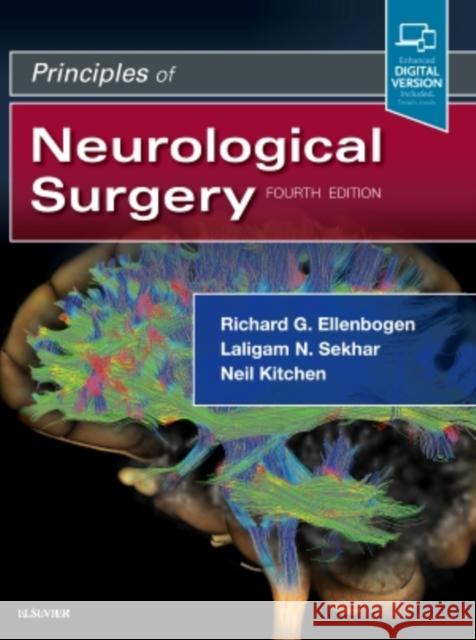Principles of Neurological Surgery » książka



Principles of Neurological Surgery
ISBN-13: 9780323431408 / Angielski / Twarda / 2018 / 848 str.
Principles of Neurological Surgery
ISBN-13: 9780323431408 / Angielski / Twarda / 2018 / 848 str.
(netto: 899,34 VAT: 5%)
Najniższa cena z 30 dni: 938,50
ok. 30 dni roboczych.
Darmowa dostawa!
Rev. ed. of: Principles of neurosurgery / edited by Setti S. Rengachary, Richard G. Ellenbogen. 2nd ed. 2005.
Wydanie ilustrowane
"This book achieves its goal of educating students and trainees about almost every topic in neurosurgery. It is comprehensive, yet to the point and brief enough to contain everything in one volume. This book provides a superb level of detail in its explanation of each topic, including a clear and efficient discussion of background and clinical relevance as well as scenarios."
Morteza Sadeh, MD PhD (University of Illinois at Chicago College of Medicine) Doody's Score: 93-4 Stars!
Ellenbogen: Principles Neurological Surgery, 4th
Section 1: General Overview
1. Landmarks in the History of Neurosurgery
2. Challenges in Global Neurosurgery
3. Pearls for Clinical Evaluation of the Nervous System
4. Principles of Modern Neuroimaging
5. Neuro Anesthesia and Monitoring for Cranial and Complex Spinal Surgery
6. Surgical Positioning, Navigation, Important Surgical Tools, Craniotomy and Closure of Cranial and Spinal Wounds
Section 2: Pediatric Neurosurgery
7. Spinal Dysraphism and Tethered Spinal Cord
8. Hydrocephalus in Children
9. Diagnosis and Surgical Options for Craniosynostosis
10. The Chiari Malformations and Syringohydromyelia
11. Posterior Fossa and Brainstem Tumors in Children
12. Craniopharyngiomas
13. All Other Brain Tumors in Pediatrics
14. Pediatric Vascular Disease and Stroke
Section 3: Vascular Neurosurgery
15. Medical and Surgical Treatment of Cerebrovascular Occlusive Disease
16. Intracranial Aneurysms, Gen Principles of Management (Ruptured and Unruptured)
17. Surgery for Anterior Circulation Aneurysms
18. Surgery for Posterior Circulation Aneurysms
19. Complex Intracranial Aneurysms and Bypasses for Aneurysms
20. Vascular Malformations (Arteriovenous Malformations and Rual Arteriovenous Fistulas)
21. Cavernous Malformations of the Brain and Spinal Cord
22. Spontaneous Intracerebral Hemorrhage
23. Endovascular Treatment of Acute Stroke and Occlusive Cerebrovascular Disease
24. Endovascular Treatment of Intracranial Aneurysms
Section 4: Trauma
25. Surgical Management of Closed Head Injury
26. Critical Care Management of Neurosurgical Patients
27. Penetrating Brain Injury
28. Traumatic Skull and Facial Fractures
Section 5: The Spine
29. Injuries to the Cervical Spine
30. Thoracolumbar Spine Fractures
31. Intradural Extramedullary and Intramedullary Spinal Cord Tumors
32. Treatment of Spinal Metastatic Tumors
33. Spinal Cord Injury
34. Craniovertebral Junction: A Reappraisal
35. Degenerative Spine Disease (Cervical)
36. Degenerative Spine Disease (ThoracoLumbar)
37. Pediatric and Adult Scoliosis
Section 6: Tumors
38. High-Grade Gliomas
39. Low-Grade Gliomas
40. Metastatic Brain Tumors
41. Convexity, And Parasagittal vs. Skull Base Meningiomas
42. Tumors of the Pineal Region
43. Cerebellopontine Angle Tumors
44. Pituitary Tumors: Diagnosis and Management
45. Endoscopic Approaches to Ventricular Tumors and Colloid Cysts
46. Microsurgical Approaches to the Ventricular System
47. Base Tumors: Evaluation and Microsurgery
48. Endoscopic Approaches to Skull Base Lesions
49. Jugular Foramen Tumors: Paraganglioma and Schwannoma
Section 7: Radiosurgery and Radiotherapy
50. Application of Current Radiation Delivery Systems and Radiobiology
51. Radiosurgery of Central Nervous System Tumors and Arteriovenous Malformations
52. Proton Beam Therapy and Particle Beam Radiotherapy for Cranial and Skull Base Tumors
Section 8: Functional Pain
53. Trigeminal Neuralgia
54. Spasticity: Classification, Diagnosis and Management
55. Surgery for Temporal Lobe Epilepsy
56. Extratemporal Procedures and Hemispherectomy for Epilepsy
57. Deep Brain Stimulation for Movement Disorders
58. Stereotactic Functional Neurosurgery for Mental Health Disorders, Pain and Epilepsy
Section 9: Miscellaneous
59. Surgical Management of Infections of the Central Nervous System, Cranium and of the Spine
60. Adult Congenital CSF Disorders
61. Management of Peripheral Nerve Injuries
62. Entrapment Neuropathies, Peripheral Nerve Tumors
63. Pre-Hospital CAre of TBI Patients
1997-2026 DolnySlask.com Agencja Internetowa
KrainaKsiazek.PL - Księgarnia Internetowa









